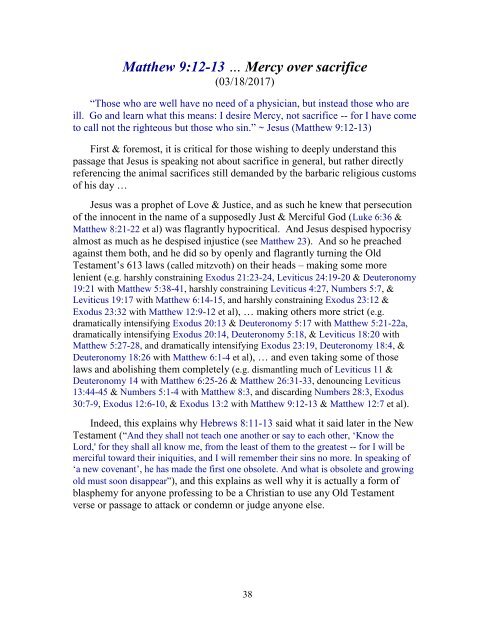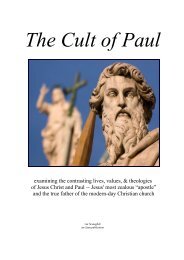My Favorite Verses - Vol V (Feb 17 to Jun 17)
An illustrated collection of brief commentaries on some of the Bible’s most beloved (and some of its least understood) passages, parables, verses & sayings
An illustrated collection of brief commentaries on some of the Bible’s most beloved (and some of its least understood) passages, parables, verses & sayings
You also want an ePaper? Increase the reach of your titles
YUMPU automatically turns print PDFs into web optimized ePapers that Google loves.
Matthew 9:12-13 … Mercy over sacrifice<br />
(03/18/20<strong>17</strong>)<br />
“Those who are well have no need of a physician, but instead those who are<br />
ill. Go and learn what this means: I desire Mercy, not sacrifice -- for I have come<br />
<strong>to</strong> call not the righteous but those who sin.” ~ Jesus (Matthew 9:12-13)<br />
First & foremost, it is critical for those wishing <strong>to</strong> deeply understand this<br />
passage that Jesus is speaking not about sacrifice in general, but rather directly<br />
referencing the animal sacrifices still demanded by the barbaric religious cus<strong>to</strong>ms<br />
of his day …<br />
Jesus was a prophet of Love & Justice, and as such he knew that persecution<br />
of the innocent in the name of a supposedly Just & Merciful God (Luke 6:36 &<br />
Matthew 8:21-22 et al) was flagrantly hypocritical. And Jesus despised hypocrisy<br />
almost as much as he despised injustice (see Matthew 23). And so he preached<br />
against them both, and he did so by openly and flagrantly turning the Old<br />
Testament‟s 613 laws (called mitzvoth) on their heads – making some more<br />
lenient (e.g. harshly constraining Exodus 21:23-24, Leviticus 24:19-20 & Deuteronomy<br />
19:21 with Matthew 5:38-41, harshly constraining Leviticus 4:27, Numbers 5:7, &<br />
Leviticus 19:<strong>17</strong> with Matthew 6:14-15, and harshly constraining Exodus 23:12 &<br />
Exodus 23:32 with Matthew 12:9-12 et al), … making others more strict (e.g.<br />
dramatically intensifying Exodus 20:13 & Deuteronomy 5:<strong>17</strong> with Matthew 5:21-22a,<br />
dramatically intensifying Exodus 20:14, Deuteronomy 5:18, & Leviticus 18:20 with<br />
Matthew 5:27-28, and dramatically intensifying Exodus 23:19, Deuteronomy 18:4, &<br />
Deuteronomy 18:26 with Matthew 6:1-4 et al), … and even taking some of those<br />
laws and abolishing them completely (e.g. dismantling much of Leviticus 11 &<br />
Deuteronomy 14 with Matthew 6:25-26 & Matthew 26:31-33, denouncing Leviticus<br />
13:44-45 & Numbers 5:1-4 with Matthew 8:3, and discarding Numbers 28:3, Exodus<br />
30:7-9, Exodus 12:6-10, & Exodus 13:2 with Matthew 9:12-13 & Matthew 12:7 et al).<br />
Indeed, this explains why Hebrews 8:11-13 said what it said later in the New<br />
Testament (“And they shall not teach one another or say <strong>to</strong> each other, „Know the<br />
Lord,' for they shall all know me, from the least of them <strong>to</strong> the greatest -- for I will be<br />
merciful <strong>to</strong>ward their iniquities, and I will remember their sins no more. In speaking of<br />
„a new covenant‟, he has made the first one obsolete. And what is obsolete and growing<br />
old must soon disappear”), and this explains as well why it is actually a form of<br />
blasphemy for anyone professing <strong>to</strong> be a Christian <strong>to</strong> use any Old Testament<br />
verse or passage <strong>to</strong> attack or condemn or judge anyone else.<br />
38


















